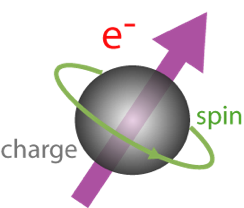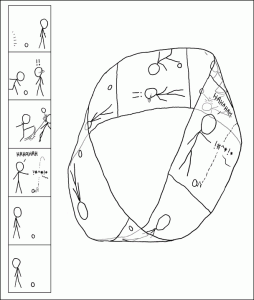 This may seem like an odd diversion, but John asked about it just this morning so I thought I’d share with the rest of the class.
This may seem like an odd diversion, but John asked about it just this morning so I thought I’d share with the rest of the class.
Electrons, in their secret life as wibbly-wobbly quantum particle-wavey things, have a property called spin. To quote a handy article I just ran across:
One of the things that was clear from experiments was that electron have spin. A first naive picture of an electron – this is not an accurate picture but it’s a start – is as a tiny ball with electric charge – which is what flows when a current flows in a wire. If you spin a ball of electric charge, the electric charge goes around in a circle. You effectively have a tiny current going around, and when you have a current like that you have a magnetic field – the electron becomes a tiny magnet. The presence of that magnetic effect is pictured as the electric charge spinning around. If the electron was still, it wouldn’t have this magnetic effect.
It gets better:
Among the many counterintuitive properties of the electron is the fact that it has spin one-half. This is the mathematical way of saying that if you rotate an electron through 360 degrees, it doesn’t look like it did before you started! There is no parallel for this in our everyday world – we are accustomed to being able to turn objects through 360 degrees and get them back to where they started.
Oh, but there is a parallel in the everyday world, or at least in my slightly-twisted mind. Think of it like so:
- Imagine a reel-to-reel film projector. Running a short length of film through end-to-end works like you think it would.
- Tape one end of the film to the other; now you have a continuous loop of film that repeats itself. This would correspond to a spin of 1, because it looks the same after one loop.
- Now tape one end of the film to the other backwards, to make a Möbius strip. The film still loops, but now it does one loop with the frames reversed left-to-right. It doesn’t repeat itself exactly until the film has looped through twice, corresponding to a spin of 1/2.
Does this mean that electrons are actually tiny loops of film? No. It only provides an analogy for this one property, and even then it might not go very far. Still, as soon as someone says “there is no X”, I have to find a counterexample. :)

